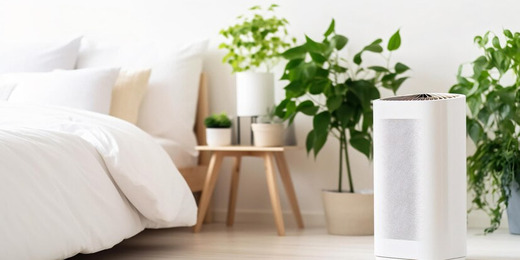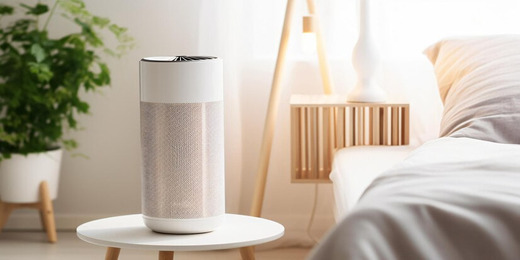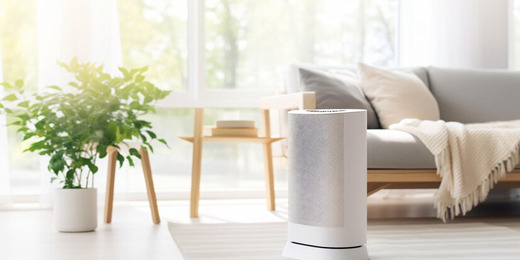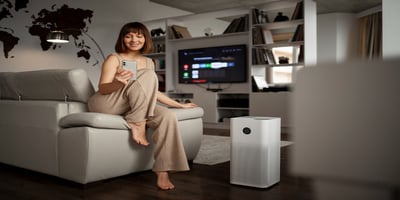Healthy Air, Healthy Habits: How Often to Run Your Air Purifier
Key Takeaways
- 24/7 operation delivers the best results – but smart usage strategies can optimize performance while managing costs effectively
- Modern air purifiers cost surprisingly little to operate – most quality units run for just $0.15-0.50 daily, less than your morning coffee
- Health conditions require personalized usage approaches – asthma, allergies, and immune issues each benefit from different operational strategies
- Proper maintenance can double your air purifier's lifespan – while improving performance and reducing long-term costs
How often to run air purifier systems is one of the most common questions new and experienced users ask. The short answer? For optimal air quality, most experts recommend continuous operation. But the real answer depends on your specific situation, lifestyle, and health needs.
The Role of Air Purifiers in Homes
Air purifiers serve as your home's defense system against invisible threats. Every day, your indoor air accumulates particles from cooking, pets, outdoor pollution, and even the simple act of walking around. Without intervention, these contaminants build up and can impact your health, comfort, and quality of life.
How Air Purifiers Improve Your Indoor Environment
Nowadays, air purifiers operate through a sophisticated four-step process that continuously improves your Air Quality:
- Smart Air Intake: Advanced fans draw contaminated air from your room, with smart sensors detecting when the Air Quality drops and automatically increasing suction power.
- Multi-Stage Filtration: The air passes through carefully designed filtration layers. HEPA filters capture 99.97% of particles as small as 0.3 microns, while pre-filters and activated carbon layers target larger particles and odors.
- Intelligent Contaminant Removal: Different filter types target specific pollutants. Dust, pollen, pet dander, smoke particles, bacteria, viruses, and volatile organic compounds (VOCs) are systematically removed based on size and chemical properties.
- Clean Air Circulation: Purified air returns to your space, creating a continuous cycle of improvement. Smart systems adjust output based on room size and current air quality readings.
Types of Air Purification Technologies
- HEPA Filter Systems: HEPA filters represent the gold standard for particle removal. These medical-grade filters capture allergens, dust, pollen, and pet dander with exceptional efficiency. They're perfect for families dealing with allergies or respiratory sensitivities.
- Activated Carbon Enhancement: Carbon filters excel at removing odors, gases, and chemical vapors. Whether it's cooking smells, pet odors, or VOCs from household products, carbon filtration creates fresher, more pleasant indoor air.
- UV-C Sanitization: Some advanced systems include UV-C light technology to neutralize bacteria, viruses, and mold spores. This added layer provides extra protection during flu season or when family members are sick.
- Smart Sensor Integration: Modern air purifiers feature intelligent sensors that monitor particle counts, air quality trends, and filter status.
Why Air Purifiers Matter More Than Ever
- Health Protection You Can Measure: Quality air purifiers significantly reduce allergen exposure. Studies show that HEPA filters can cut household allergen levels by up to 85%, providing measurable relief for allergy and asthma sufferers.
- Sleep Quality Improvement: Cleaner bedroom air leads to better sleep. Removing irritants and particles helps reduce nighttime coughing, congestion, and restlessness that poor air quality can cause.
- Odor Elimination: Beyond health benefits, air purifiers create more pleasant living spaces. Activated carbon technology removes persistent odors that traditional cleaning can't address.
- Protection During Health Concerns: When family members are sick, air purification helps reduce the spread of airborne pathogens. This becomes especially important in homes with elderly residents or those with compromised immune systems.
- Smart Home Integration Benefits: Modern systems like Sensibo Pure integrate with your smart home ecosystem, allowing you to monitor and control air quality remotely. You can adjust settings based on daily routines, weather conditions, or local air quality forecasts.
Should I Leave My Air Purifier Running 24/7?
The science is clear: yes, continuous operation delivers the best results for your health and comfort.
Here's why 24/7 operation makes sense. Air pollution doesn't take breaks. Every time you open a door, cook dinner, or your pet walks through the house, new contaminants enter your space. Without constant filtration, these pollutants accumulate quickly.
Air purifiers are designed for continuous operation. They feature energy-efficient motors and smart sensors that adjust operation based on real-time air quality readings. This means your purifier works harder when needed and runs quietly when air quality is good.
The energy cost won't shock you either. Most quality air purifiers consume between 50-100 watts per hour. That translates to roughly $5-10 per month in electricity costs – about the same as leaving a few LED light bulbs on.
When to Use an Air Purifier?
1. During Allergy Season
Pollen counts spike during spring and fall, making continuous operation essential. Run your purifier on higher settings during peak pollen hours (typically morning and early evening). Keep windows closed and let your filters do the heavy lifting.
2. Pet Owners' Priority
Pet dander circulates constantly throughout your home. If you have furry family members, continuous operation becomes essential for maintaining clean air. Place purifiers in rooms where pets spend the most time, especially bedrooms, if pets sleep there.
 3. After Cooking
3. After Cooking
Cooking releases particles, odors, and sometimes harmful compounds into your air. Boost your purifier to maximum settings during and after cooking, especially when frying or using high-heat methods.
4. Wildfire Season
During wildfire events, outdoor Air Quality can become dangerous. Seal your home and run purifiers continuously on high settings. This is when you'll truly appreciate the investment in a quality system.
5. Home Renovation Projects
Construction dust, paint fumes, and VOCs from new materials require aggressive filtration. Run purifiers 24/7 during renovation and for several weeks afterward to clear lingering particles and chemicals.
Should I Rely on Auto Mode or Manual Settings for the Best Results?
Modern smart air purifiers take the guesswork out of optimal operation timing.
1. Auto Mode Benefits
Auto mode uses real-time air quality sensors to adjust fan speeds automatically. When sensors detect increased pollution, the system ramps up. During clean air periods, it reduces to energy-saving speeds. This delivers optimal cleaning while minimizing energy consumption.
2. Smart Home Integration
Systems integrate with smart home platforms, allowing you to monitor and control air quality remotely. You can schedule operations around your daily routine, boost settings before arriving home, or adjust based on local air quality forecasts.
3. Air Quality Monitoring
Built-in sensors provide real-time feedback about your indoor environment. Many smart purifiers display particle counts, allowing you to see exactly how your usage patterns affect air quality throughout the day.
These smart features raise an important question: what about the ongoing costs of running these systems?
 What's the Daily Cost of Running an Air Purifier?
What's the Daily Cost of Running an Air Purifier?
The true costs of air purifier usage help you make informed decisions about operation schedules.
Daily Energy Costs Breakdown
Daily electricity costs vary based on your purifier's power consumption and local energy rates. Here's what you can expect for 24/7 operation:
Small Room Purifiers (30-50 watts):
- Daily cost: $0.09 - $0.14 (based on $0.12/kWh average)
- Monthly cost: $2.70 - $4.20
- Annual cost: $32 - $50
Medium Room Purifiers (50-100 watts):
- Daily cost: $0.14 - $0.29
- Monthly cost: $4.20 - $8.70
- Annual cost: $50 - $105
Large Room Purifiers (100-150 watts):
- Daily cost: $0.29 - $0.43
- Monthly cost: $8.70 - $12.90
- Annual cost: $105 - $155
Smart Models (Variable 15-70 watts):
- Daily cost: $0.04 - $0.20 (auto-adjusts based on air quality)
- Monthly cost: $1.20 - $6.00
- Annual cost: $15 - $72
Note: Your actual costs may be higher or lower depending on your local electricity rates (which range from $0.08-$0.20+ per kWh across different regions), how often you run the purifier, and your specific model's energy efficiency.
Filter Replacement Schedules
Continuous operation does mean more frequent filter changes. HEPA filters typically last 6-12 months with 24/7 use, while pre-filters may need monthly replacement.
- Premium HEPA filters: $25-60 each, lasting 8-12 months
- Standard HEPA filters: $15-35 each, lasting 6-10 months
- Annual HEPA cost: $20-90, depending on usage and quality
Cost Per Room Calculations
Calculate your specific room costs based on square footage:
- Small Bedrooms (100-200 sq ft): $0.15-0.25 daily
- Standard Bedrooms (200-300 sq ft): $0.25-0.35 daily
- Living Rooms (300-500 sq ft): $0.35-0.50 daily
- Open Floor Plans (500+ sq ft): $0.50-0.75 daily
Real-World Cost Comparison
Put these numbers in perspective with common household expenses:
- Daily air purifier operation: $0.23-0.47
- Daily coffee shop visit: $4.50
- Monthly streaming service: $15.99
- Weekly takeout meal: $25
Your daily air purification costs less than a single coffee while providing 24/7 health benefits for your entire family.
Which Maintenance Tasks Prevent the Most Expensive Repairs?
Proper maintenance ensures your air purifiers deliver consistent performance regardless of usage frequency.
- Regular Filter Checks: Monthly filter inspections keep your system running efficiently. Clogged HEPA filters reduce airflow and increase energy consumption while compromising cleaning effectiveness.
- Sensor Cleaning: Air quality sensors need periodic cleaning to maintain accuracy. Dust buildup on sensors can cause false readings, leading to inefficient operation patterns.
- Professional Servicing: Annual professional maintenance, especially for whole-home systems, ensures optimal performance and extends equipment life. Professional technicians can identify issues before they become costly problems.
- Noise Monitoring: Listen for unusual sounds that might indicate motor or fan issues
- Placement Optimization: Reassess room layout and reposition the unit if furniture or obstacles now block airflow
- App Updates: Keep smart purifier apps updated for optimal sensor accuracy and features
 Seasonal Maintenance Schedule
Seasonal Maintenance Schedule
- Spring: Deep clean before allergy season, replace filters, check for winter damage
- Summer: Increase cleaning frequency during high-usage periods, monitor for overheating
- Fall: Prepare for increased indoor time, stock up on filters, and test all functions
- Winter: Check for proper operation in dry conditions, monitor humidity effects
Should I Prioritize 24/7 Clean Air or Worry More About Electricity Bills?
For most families, continuous operation provides the best air quality outcomes. The relatively low energy costs and significant health benefits make 24/7 operation a smart choice. However, if budget constraints require compromising, prioritize operation during high-pollution periods and in bedrooms where you spend the most time.
Remember that clean air goes beyond comfort – creating a healthier environment supports better sleep, reduced allergies, and improved overall well-being for everyone in your home.
FAQ
How long should I run my air purifier each day if I can't leave it on 24/7?
If continuous operation isn't possible, aim for at least 8-12 hours daily, prioritizing nighttime operation in bedrooms and peak activity hours in living areas.
Will running my air purifier all the time damage it?
No, modern air purifiers are designed for continuous operation. Regular maintenance and filter replacement will keep your system running efficiently for years.
Should I turn off my air purifier when I open windows?
Yes, turn off air purifiers when windows are open. Opening windows allows outdoor pollutants inside and reduces purifier efficiency significantly.
Can I use timers to automate my air purifier usage?
Absolutely! Smart models offer advanced scheduling options, while basic timers work well for conventional units to balance efficiency and cost.
How do I know if my air purifier is working effectively?
Monitor air quality readings if your purifier has sensors, watch for reduced allergy symptoms, and notice improvements in dust accumulation and overall air freshness.


































.jpg)

.jpg?height=200&name=photo_2024-04-24_20-21-17%20(1).jpg)

